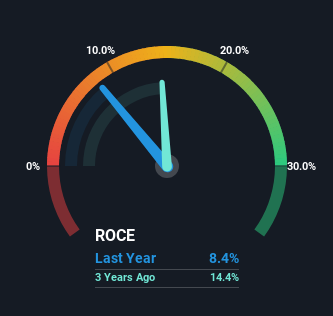- India
- /
- Electronic Equipment and Components
- /
- NSEI:SYRMA
Returns On Capital Signal Tricky Times Ahead For Syrma SGS Technology (NSE:SYRMA)
What are the early trends we should look for to identify a stock that could multiply in value over the long term? Firstly, we'd want to identify a growing return on capital employed (ROCE) and then alongside that, an ever-increasing base of capital employed. If you see this, it typically means it's a company with a great business model and plenty of profitable reinvestment opportunities. However, after briefly looking over the numbers, we don't think Syrma SGS Technology (NSE:SYRMA) has the makings of a multi-bagger going forward, but let's have a look at why that may be.
Return On Capital Employed (ROCE): What Is It?
If you haven't worked with ROCE before, it measures the 'return' (pre-tax profit) a company generates from capital employed in its business. Analysts use this formula to calculate it for Syrma SGS Technology:
Return on Capital Employed = Earnings Before Interest and Tax (EBIT) ÷ (Total Assets - Current Liabilities)
0.084 = ₹1.5b ÷ (₹29b - ₹11b) (Based on the trailing twelve months to September 2023).
Thus, Syrma SGS Technology has an ROCE of 8.4%. Ultimately, that's a low return and it under-performs the Electronic industry average of 12%.
View our latest analysis for Syrma SGS Technology

In the above chart we have measured Syrma SGS Technology's prior ROCE against its prior performance, but the future is arguably more important. If you'd like to see what analysts are forecasting going forward, you should check out our free analyst report for Syrma SGS Technology .
What The Trend Of ROCE Can Tell Us
In terms of Syrma SGS Technology's historical ROCE movements, the trend isn't fantastic. To be more specific, ROCE has fallen from 21% over the last four years. Although, given both revenue and the amount of assets employed in the business have increased, it could suggest the company is investing in growth, and the extra capital has led to a short-term reduction in ROCE. And if the increased capital generates additional returns, the business, and thus shareholders, will benefit in the long run.
On a side note, Syrma SGS Technology has done well to pay down its current liabilities to 38% of total assets. So we could link some of this to the decrease in ROCE. Effectively this means their suppliers or short-term creditors are funding less of the business, which reduces some elements of risk. Since the business is basically funding more of its operations with it's own money, you could argue this has made the business less efficient at generating ROCE.
The Bottom Line On Syrma SGS Technology's ROCE
Even though returns on capital have fallen in the short term, we find it promising that revenue and capital employed have both increased for Syrma SGS Technology. And the stock has followed suit returning a meaningful 75% to shareholders over the last year. So while investors seem to be recognizing these promising trends, we would look further into this stock to make sure the other metrics justify the positive view.
If you want to know some of the risks facing Syrma SGS Technology we've found 2 warning signs (1 is concerning!) that you should be aware of before investing here.
If you want to search for solid companies with great earnings, check out this free list of companies with good balance sheets and impressive returns on equity.
New: Manage All Your Stock Portfolios in One Place
We've created the ultimate portfolio companion for stock investors, and it's free.
• Connect an unlimited number of Portfolios and see your total in one currency
• Be alerted to new Warning Signs or Risks via email or mobile
• Track the Fair Value of your stocks
Have feedback on this article? Concerned about the content? Get in touch with us directly. Alternatively, email editorial-team (at) simplywallst.com.
This article by Simply Wall St is general in nature. We provide commentary based on historical data and analyst forecasts only using an unbiased methodology and our articles are not intended to be financial advice. It does not constitute a recommendation to buy or sell any stock, and does not take account of your objectives, or your financial situation. We aim to bring you long-term focused analysis driven by fundamental data. Note that our analysis may not factor in the latest price-sensitive company announcements or qualitative material. Simply Wall St has no position in any stocks mentioned.
About NSEI:SYRMA
Syrma SGS Technology
Provides turnkey electronic manufacturing services in India, the United States, Germany, and internationally.
High growth potential with excellent balance sheet.
Similar Companies
Market Insights
Community Narratives



